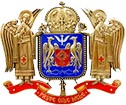

Friday, 27 November 2015, at 11.00 hours, the Romanian Academy organised, in the Festivity Hall of the Romanian Academy, a session dedicated to the Day of 1 December 1918 – National Day of Romania. His Beatitude Daniel, Patriarch of Romania, was also invited to the event, where he delivered a speech in which he emphasised the contribution of the Church of the Romanian people to its Great Union into a unitary state.
After playing the National Anthem, the solemn session was opened with the speech of the President of the Romanian Academy, academician Ionel-Valentin Vlad, who evoked the historical time that marked the Great Union of 1918.
“The realization of the full unity of the Romanian state on 1 December 1918 was the result of the organisation of some outstanding intellectuals with solid formation, of the fight of tens of thousands of peasants who fought in battlefields for defending their national territory. The fights waged during the World War I meant a great sacrifice for Romanians. It was a lesson of patriotism which will remain a brilliant example for the entire period passed ever since. The authors of this Great Union taught us a sacred lesson, namely that of unity, solidarity, giving up vain selfishness, placing national interest higher than personal or group ambitions, promoting tolerance and mutual respect”, the President of the Romanian Academy emphasised.
His Beatitude Patriarch Daniel delivered, in his turn, the speech entitled The Church of the Romanian people has intensely contributed to its Great Union into a unitary state, out of which we render a fragment below: “The achievement of the national unity on 1 December 1918 was possible with the contribution of the Romanian Orthodox Church too, which supported the Great Union of all the Romanian provinces into a unitary Romanian State, the Church having always been together with the people in all its efforts to cultivate the national conscience and affirmation of the desire of national unity, in the Romanian provinces, especially in Transylvania, Bessarabia and Bucovina. Today, we thank God glorified in the Holy Trinity for all the blessings of the Great Union, and remember with gratitude all the Romanian heroes who sacrificed themselves for the freedom, unity and dignity of the Romanian people. It is a very significant fact that the feast of the Holy Trinity is the dedication day of the cathedrals of the great Transylvanian cities which militated for Union: Sibiu, Blaj, Alba-Iulia and Arad, since the Holy Trinity had become the symbol of struggle for unity into a single state of the three Romanian provinces: Wallachia, Moldova and Transylvania.
During the solemn session, other personalities of the Romanian culture and society delivered speeches.
Academician Dan Berindei, honorary president of the Department for Historical and Archaeological Sciences of the Romanian Academy, remembered in his speech that time stops once a year to allow for celebrating the day of the 1 December 1918. But this occasion must also be the basis of reconciliation and peace. Divergences must be forgotten and solidarity and unity must be common to all people. The National Day is the great day of feast and celebration, as well as of remembering those who used to be and who contributed to the construction of the country in one way or another. (...) The past must also be today a great time confirming the feelings that the inhabitants of the country must have, as its true sons and sons of humankind. Our nation has paid a great tribute of blood and sufferance. Victory and achievement stemmed from the love for homeland, from sufferance and sacrifice. Much more than this, here, at the gates of the East, we were the defenders of the continent and we stopped the invasions that threatened Europe, together with the Poles, our neighbours at the time. We benefited at the time of clever leaders devoted to the nation and not to other interests, and succeeded, in a rather short historical time, not only to succeed in re-establishing and restoring the country, but also achieving the mutual good understanding and national merge.
The next speech was delivered by university professor dr. Cornel Sigmirean, director of “Gheorghe Şincai” Institute of Social Human Research of Târgu Mureş, who showed that the Great Union was the apotheosis of the Romanians and it represents, first of all, the triumph of the principle of nationality. Then, university professor dr. Daniel Breaz, rector of 1 December 1918 University of Alba Iulia, emphasised the fact that ASTRA Association of Sibiu took over the ideals of the Transylvanian School and of the promoters of the 1848ʼ revolutionaries, contributing to the Great Union, through well organised cultural activities, identifying itself with the aspirations of the Romanians from Transylvania and from the rest of the empire. University professor dr. Gheorghe Iacob, deputy rector of “Alexandru Ioan Cuza” University of Iaşi, pointed out the fact that the Romanian people is one of the few peoples of the world who has “unity” as the symbol of the National Day, and mentioned several factors which contributed to the achievement of the Great Union, such as legitimacy, in spite of the centuries old denationalisation which the Romanian provinces were submitted to; the representative character of the Great Union; the role of the Romanian elite, of the Church and of the Army of the Romanian provinces to the achievement of unity. The President of the civic Forum of the Romanians from Harghita, Covasna and Mureş, dr. Ioan Lacatusu, delivered the last speech in which he presented aspects of the history of the Romanians inside the Carpathian arch, and presented, in the end, the book entitled Romanian identity landmarks in the counties of Covasna and Harghita.